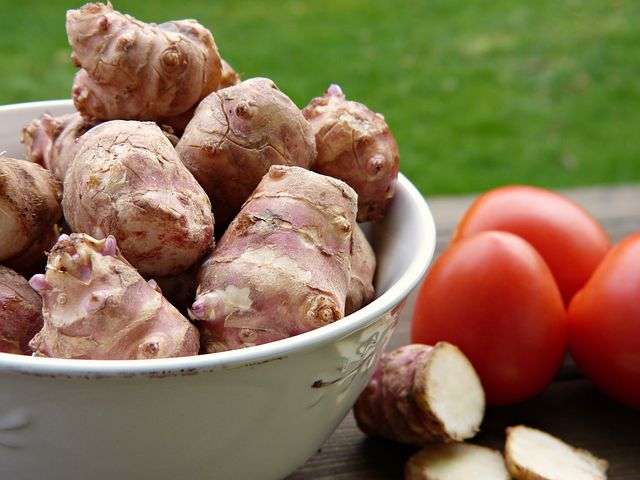
What do you think of when you hear the word artichoke?
When you think of an artichoke, do you envision that green spiny vegetable that holds inside it that beautifully delicious and nutritious artichoke heart? I think that’s what most of us do. That one is called a Globe Artichoke and is quite a bit more well-known than the Jerusalem Artichoke. They have similar names however they don’t have a lot in common. The Globe belongs to the thistle family, and Jerusalem Artichoke, also called a sunchoke, belongs to the aster family.
What does a sunflower have to do with a Jerusalem artichoke?
The Globe artichoke, which has been around forever, is native to southern Europe and widely cultivated in the Mediterranean regions and central Europe. Jerusalem artichoke originates in North America. Cultivation of Jerusalem artichoke started long before first European settlers arrived to America.
It’s often believed that the name comes from “artichokes from Jerusalem.” It actually comes from Italian “girasole carciofi,” which means sunflower artichoke in English. Some of the common names are sunroot, sunchoke, topinambur etc. Its scientific name is Helianthus tuberosus.
When in bloom, the sunchoke looks much like a miniature sunflower. To get to the edible part you have to dig up the bulbous root in spring, before the plant has blossomed. That edible part is known as the knobby tuber, which looks like a ginger root. The skin of the root can be eaten, too, as long as its thoroughly scrubbed.
A knobby tuber.
This knobby tuber, like ginger and turmeric with their rhizomes (mass of roots), is chock-full of goodies from the inside out.
 You can eat it raw, roasted, boiled, steamed or mashed and can be added to many dishes. Put it in salads, soup or sandwiches to improve vitamin, mineral and fiber content. It’s a root vegetable and eaten in much the same way like potato in many parts of Western Europe and Mediterranean regions.
You can eat it raw, roasted, boiled, steamed or mashed and can be added to many dishes. Put it in salads, soup or sandwiches to improve vitamin, mineral and fiber content. It’s a root vegetable and eaten in much the same way like potato in many parts of Western Europe and Mediterranean regions.
Jerusalem artichoke is excellent source of vitamins B1 and B3 as well as minerals and electrolytes such as iron, potassium, copper and phosphorus. It also has some of the B-complex group of vitamins such as folates, pyridoxine, pantothenic acid, riboflavin, and thiamine.
A great source of dietary fiber.
 Jerusalem artichoke is a great source of dietary fiber. Fiber is the indigestible portion of food derived from plants. A high-fiber diet can normalize bowel movements. It contains small amounts of antioxidant vitamins such as vitamin C, vitamin A, and vitamin E. Combine that with no cholesterol and almost no fat, and you just might have to add sunchokes to your diet. They’re low in sodium, too.
Jerusalem artichoke is a great source of dietary fiber. Fiber is the indigestible portion of food derived from plants. A high-fiber diet can normalize bowel movements. It contains small amounts of antioxidant vitamins such as vitamin C, vitamin A, and vitamin E. Combine that with no cholesterol and almost no fat, and you just might have to add sunchokes to your diet. They’re low in sodium, too.
With its iron, copper and vitamin C nutrients, Jerusalem artichokes are a good source for hair health. This iron carries oxygen to the hair, keeping hair follicles healthy. Similar to iron, copper helps prevent hair loss and boost hair growth. Vitamin C helps because is required for the synthesis of collagen. Collagen contributes to healthy hair by strengthening hair follicles and by keeping blood vessels in the scalp healthy.
Where does inulin fit in?
Prebiotics are getting a lot of press these days. They deserve it. Prebiotics are food ingredients, typically non-digestible fiber compounds, that cause the growth or activity of beneficial fungi and bacteria in the gastrointestinal tract. Your GI tract requires the right balance of bacteria to stay healthy. Gut bacteria play a role in many important functions in the body, including helping your immune system, making serotonin, creating energy for your body from the food you eat, and disposing of foreign substances and toxins.
Unfriendly bacteria like to make themselves known in a number of ways. Diarrhea, constipation, bloating, nausea, and heartburn are well-known symptoms of problems in the gut. Leaky Gut Syndrome is becoming more prevalent as modern diets and lifestyles negatively contribute to overall health through our digestive system. Food cravings, weight gain or loss, feeling moody or anxious, difficulty staying or falling asleep, skin issues, and other health problems are often symptoms of a dysfunctional gut.
Jerusalem artichokes contain plenty of inulin, a complex carbohydrate which improves absorption of calcium and magnesium from the food we eat and lowers blood cholesterol level. It also stimulates the growth of Bifidobacteria and fights harmful bacteria. We don’t have a permanent supply of gut bacteria so we need to constantly replace them through our diet.*
Jerusalem Artichoke is also considered to help control cholesterol and blood pressure, assist with new blood cell formation, help boost the immune system, and support blood glucose levels.
Jerusalem artichoke may be used as a treatment for the following health benefits:
• Normalizing bowel movements
• Lowering blood pressure
• Promote weight loss
• Fighting food cravings
• Help prevent mood swings
• Improving diabetes control
• Lowering blood pressure
• Reducing risk of heart disease and stroke
• Providing a high amount of Vitamin B1 (thiamine). Thiamine is crucial for the proper functioning of the nervous system and the muscles. It is also needed for carbohydrate metabolism as well as for the production of hydrochloric acid in the stomach.
Check out this super-easy recipe from Jamie Oliver for sautéed Jerusalem artichokes with garlic and bay leaves:
Interesting fact:
In 2012, a US distillery made a brandy from Jerusalem artichokes. They said “sunchokes are the root of certain varieties of Sunflowers and have a unique natural sweetness. This spirit is perhaps one of the most unique in the country and tastes like tipsy sunflower seeds.”
If you'd like to check out one of our products that contains Jerusalem Artichoke, please visit this link:
Leaky Gut by Professional Botanicals
* An excellent product to help support a healthy GI tract is Supreme Probiotics by Dynamic Nutritional Associates (DNA Labs).
One capsule of Supreme Probiotics contains 4 billion cfu*:
• Lactobacillus acidophilus
• Bifidobacterium lactis
• Lactobacillus casei
• Lactobacillus rhamnosus
_______________________________________________________________________________________________
Note: The content of this article, and additional content on this website, are for informational purposes only and are not intended to be a substitute for professional medical advice, diagnosis, or treatment. Always seek the advice of a physician or other qualified health provider with any questions you may have regarding a medical condition. Never disregard professional medical advice or delay in seeking help because of something you read here on this website.



